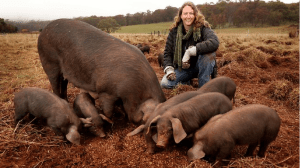A version of this article first appeared in the Coffs Coast Advocate on Saturday 31st May, 2014
About nine months ago I first wrote a column about the emergence of crowd-funding as an alternative means by which direct-marketing farmers could raise finance to invest in capital enhancements and equipment purchases. Those investments in turn would enable on-farm value-adding and diversification that could make the critical difference between going under and going from strength-to-strength.
Judging by the numbers of farm-based crowd-funding campaigns in the past few weeks and months, there is a growing community appetite around the country to get behind local producers. On platforms such as Pozible, fundraising is structured around a rewards system, so for every pledge, you receive a specified ‘reward’ of goods produced on the farm. The higher your pledge, the greater your reward.
Producers like it because, if well structured and well promoted, these campaigns help raise their profile as an innovative supplier of good food to local communities. And of course because, unlike a loan or mortgage from a bank, there is no obligation to pay any interest. Repayment is in farm produce.
As my friend and fellow Committee member of the Australian Food Sovereignty Alliance, Tammi Jonas, puts it:
“Your support helps us reach our goals to be ethically viable without taking on debt from the banks to line shareholders’ pockets. Instead of feeding the banks, let us feed you with our range of tasty rewards in return for your pledge to help us reach our goal!”
Tammi and her husband Stuart (Jonai Farms, rare breed pigs) have just launched a campaign to raise $30,000 to build on an on-farm curing room and commercial kitchen, following the success of their campaign last year to build an on-farm butchery. Another free range pig farmer, Lauren Mathers, has just successfully raised $15,000 to build an on-farm charcuterie to make pork small goods.
And a truly enterprising young poultry farmer, Madelaine, raised a record-breaking $67,986 to purchase an egg cleaning and grading machine so she could increase her sales of organic and free range eggs direct to customers in Melbourne.
Crowd-funding in NSW
In northern NSW, I’m happy to report that there is an exciting new food social enterprise initiative just starting in Mullumbimby. Future Feeders is a project launched by a small group of local young people, aiming to create pathways for young people to enter agriculture and be supported in developing their skills and capacities to have viable and long-term careers in sustainable food production.
As I’ve written in this column several times previously, Australia is facing an agrarian demographic crisis. According to ABS data, the percentage of Australian farmers under 35 had fallen to 13% by 2011, from 28% thirty years previously. A quarter of all our farmers are over 65. We are quite literally relying on a workforce of pensioners to do a lot of the heavy  lifting in feeding us. This is both grossly unfair and dangerously non-resilient.
lifting in feeding us. This is both grossly unfair and dangerously non-resilient.
That is why it is so encouraging when groups of young people are motivated, enthusiastic and committed to enter agriculture. Future Feeders have a 2 acre urban farm operational in Mullumbimby, on which they have secured a five-year community land lease. They are looking to partner with retiring farmers on a land-share basis, to turn disused or under-utilised parcels of land into thriving centres of sustainable and diverse production for local and regional markets.
They are seeking support to raise start-up capital to purchase necessary irrigation, transport, fencing and storage equipment so they can hit the ground running. And they want to share their knowledge, expertise and resources widely through a co-operative farm management and community-supported agriculture model.
Simon Richardson, Mayor of Byron Shire Council, has this to say about Future Feeders:
“This group walks their talk: they get their hands into the soil and do so cooperatively, intelligently ad passionately. They are the future of the next generation of farmers.”
For more information, contact Joel Orchard, Project Manager, joel@futurefeeders.org
To support their crowd-funding campaign, visit www.chuffed.org/project/future-feeders




















